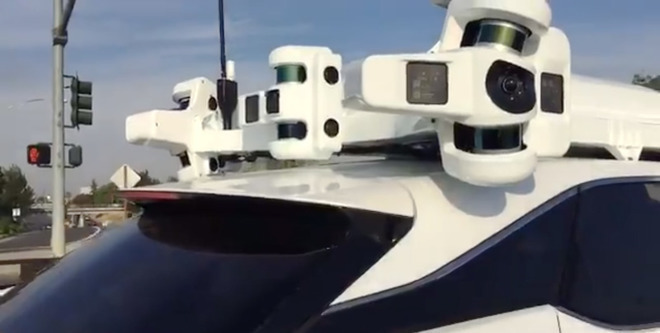Apple is stepping up its automotive efforts as part of "Project Titan," with the firm reportedly in discussions with a number of component suppliers about LiDAR sensors that could be used in the iPhone maker's next generation of self-driving vehicle systems.
The ongoing "Project Titan" is home to Apple's vehicle-related research, with the main focus being in the development and testing of a self-driving car. Apple has already produced a variety of sensor test beds for its fleet of test vehicles, but it appears to already be working on the next test bed generation.
According to sources of Reuters, Apple has been in talks with at least four potential suppliers of LiDAR sensors, which could be incorporated into Apple's trials. Apple is thought to be evaluating the technology offered by each of the unidentified companies, while simultaneously working on developing its own LiDAR hardware.
The updated components at the center of the discussions are smaller and cheaper than the currently used versions, making them easier to mass produce, and to potentially hide within a vehicle to make the system as a whole less obvious to outside observers. Apple is said to demand a "revolutionary design" for the components, ones that depart greatly from existing designs.
Existing systems are expensive, costing an estimated $100,000 per car, and the bulkiness and use of mechanical components to sweep the lasers introduces issues with reliability. A non-mechanical alternative would in theory be more robust, while a smaller and cheaper component would likely help foster the use of self-driving system development.
Despite the search for self-driving components, and a renewed interest in the field, it is not entirely clear what Apple's ultimate intention for "Project Titan" actually is, as it could be just for computer-aided navigation and control, or it could result in the production of an Apple-designed car.
While the focus on self-driving technology lends itself to the possibility Apple is forming a system that it could offer other car producers to use in their vehicles, there have been occasional indications the design of a full car is on the cards. There is a plethora of patents and patent applications relating to car design, including power transfer systems, safety, and even ways for sunroof systems to function.
Apple laid off 190 people from Project Titan in February as part of a wide management shakeup, following after another 200 who were dismissed in January, but there are still people being brought aboard. In March, Apple hired a former Tesla engineer with a background in powertrain development, raising the possibility Apple's car could be some form of electric vehicle.
 Malcolm Owen
Malcolm Owen







-m.jpg)






 Christine McKee
Christine McKee
 Marko Zivkovic
Marko Zivkovic
 Mike Wuerthele
Mike Wuerthele

 Amber Neely
Amber Neely
 Sponsored Content
Sponsored Content
 Wesley Hilliard
Wesley Hilliard










3 Comments
It was recently announced by a potential rival that extensively tested and proven LiDAR sensor arrays already are under $7500 (perhaps well under by now) and will even be selling their own brand to outside companies at around an est. $5K, tho granted it will be a shorter range version of the one they use themselves. Perhaps the $75000 quoted in the article is old pricing prior to the recent build-up in autonomous testing across the industry.
Costs are coming down fast and with roughly 70 LiDAR startups in the game at last count putting pressure on the entrenched companies like Velodyne ( it looks like that's who Apple is initially using which makes great sense) I suspect they'll be coming down even faster. Good sensor units for a few hundred dollars in the near future is not out of the question IMO.
LIDAR ruins CMOS sensors and is potentially harmful for your eyes.
Its recordings result in a distorted view that has to be corrected in a non trivial way.
Dead end technology.
But what is the goal? The commoditization of LIDAR?